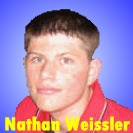An Interview with my Great-Uncle Saul Grand
by: Nathan Weissler

This past summer, I interviewed my mother’s uncle, Saul Grand,
who served in Europe during World War II as a member of the U.S. Army. After the
war, he married my mother’s paternal aunt, Roslyn, and together they ran a
printing business. My great-uncle and I primarily discussed his childhood and
wartime experiences. I learned new things both about his life experiences and
our family history. Saul Grand was born and raised in 1919 in Brownsville, a
neighborhood in Brooklyn, New York. He was the only child of Samuel and Lillian
(“Jenny”) Aronoff Grand. His mother was a local Democratic political activist
who was friends with several politicians. He told me it was not atypical for
people such as U.S. Senator Herbert Lehman of New York to be dinner guests at
his home. My great-uncle added that he would read the New York Times so he could
engage in political arguments with the guests which made his mother angry.
My great-uncle told me, “The area in which I grew up in Brownsville was a very
active, socially conscious area so that all sorts of things of a cultural
nature, race relations and so on, would be a subject that was constantly being
discussed.” After attending Erasmus and Franklin K. Lane High Schools in
Brooklyn, he went on to attend Brooklyn College, in the late 1930s. After the
American entry into World War II, following the Japanese military attack on
Pearl Harbor, Hawaii, my great-uncle enlisted in the U.S. Army and served as a
radar technician. Remembering the historical times, my great-uncle remembered
the question of American involvement in World War II as, “…a very divisive
subject throughout the country….[After] Pearl Harbor, about 98% of the attitudes
changed to one [of], ‘We’ve got to get in this thing and beat the Japs’ and
subsequently, ‘beat the Germans.”
My great-uncle went to Europe and, as many Americans of his generation did, he
fought for liberty. I was especially moved by his telling me that he experienced
no anti-Semitism within the army. He remembered, "...the unit in which I was
attached...was a unit of forty-eight men and three officers. A very small group.
.... my commanding officer who was a... very religious Catholic, felt that every
soldier should have his religion respected. He went out of his way to make the
two or three Jewish soldiers in his unit...have every opportunity to go to
Shabbat, to Jewish holidays.... I can never remember any anti-Semitic
moment...."
At this time of year, as we prepare to celebrate Chanukah with the holiday's
themes of freedom, sacrifice and courage, it is important to remember not only
my great-uncle, but many young adults like him who served in World War II.
During the D-Day invasion of June 6, 1944, along with many others, my
great-uncle helped support the radar equipment on the ship, USS Augusta. “When
the invasion was over,” he remembered, “they didn’t send the Augusta back but
they put us on a separate, smaller boat and sent us back to England.” My
great-uncle was also in Germany when Dachau concentration camp was liberated.
"...the army was sending trucks," he remembered, "to round up Germans to force
them to clean up the camp. That was my job. I was in charge of a group of two or
three trucks...."
He was honorably discharged in December 1945 and married my mother's aunt in
1947. They moved to Valley Stream, New York where they still live today. They
have two children and two grandchildren.